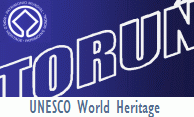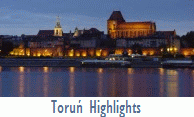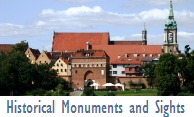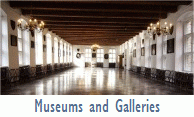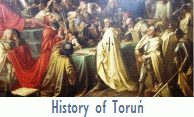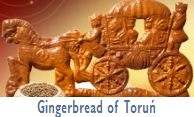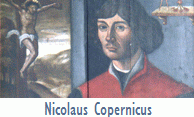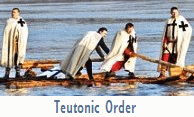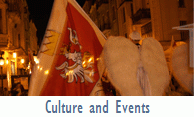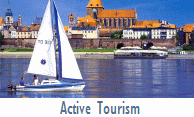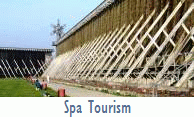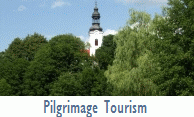|
Toruń is one of the oldest and full of historical monuments cities in Poland with the population over 205,000. It is a large centre of economic life, science, culture and a popular tourist destination. Lying on the Vistula River and the southern edge of the Chelmno Land (former Teutonic order localization) the city is an 800 years old. With its Hanseatic tradition, it has for ages played a major role in the commercial relationships between Northern and Western Europe on the one hand, and the countries of Central and Eastern Europe on the other hand. Today Toruń is the self-government capital of the Kuiavia-Pomerania administrative region (Polish: Województwo Kujawsko-Pomorskie) and an important administration centre.
Fragment of the 17th-century Vistula River panorama of old Toruń
 i .............................................................................................................................................................................
i
Educated men of intellect have always been estimated in Toruń. Throughout the centuries incomers, known for their erudition, had been encouraged to settle in the city, where they were offered prosperous living standard. In order to educated the local youth new schools had been established, whereas more affluent residents of Toruń had been frequently sending their sons to famous universities. This was done by popular merchant Nicolaus Copernicus (>>), although he probably was not aware of splendor that will be bestowed upon the city by his offspring.
Among the eminent personalities in Toruń, Nicolaus Copernicus was undoubtedly the greatest. However, there were others who made the city famous by their artistic contribution. People who significantly contributed to the development of Polish or European
 science include, for example Paulus Guldenius (1588-1658) – an eminent pharmacist, the court pharmacist of Polish King Ladislas Vasa and John Casimir Vasa, the author of the first Polish-German-Latin dictionary of pharmaceutical terms, comprising descriptions of the then medicines and illnesses; Adam Freytag (1608-1650) – a military engineer, doctor, professor, recognized expert on the Old Dutch School of Fortification; Samuel Thomas Soemmerring (1755-1830) – the most eminent anatomist, doctor and physiologist of the turn of the 19th century, the discoverer of macula lutea (an oval yellow spot near the centre of the retina of the human eye) and designer of the galvanic telegraph; Fryderyk Skarbek (1792-1866) – a leading representative of Polish economical thought, a professor of Warsaw University (for more click here). science include, for example Paulus Guldenius (1588-1658) – an eminent pharmacist, the court pharmacist of Polish King Ladislas Vasa and John Casimir Vasa, the author of the first Polish-German-Latin dictionary of pharmaceutical terms, comprising descriptions of the then medicines and illnesses; Adam Freytag (1608-1650) – a military engineer, doctor, professor, recognized expert on the Old Dutch School of Fortification; Samuel Thomas Soemmerring (1755-1830) – the most eminent anatomist, doctor and physiologist of the turn of the 19th century, the discoverer of macula lutea (an oval yellow spot near the centre of the retina of the human eye) and designer of the galvanic telegraph; Fryderyk Skarbek (1792-1866) – a leading representative of Polish economical thought, a professor of Warsaw University (for more click here).The intellectual elite of Toruń was created over centuries as well by such celebrities as Heinrich  Stroband (1548-1609), a bibliophile, humanist, art patron, and at the same time the mayor of the city and founder of the Toruń Academic Gymnasium known for its high level of education and popularization of progressive ideas, Jakub Kazimierz Rubinkowski (1668-1749), a nobleman coming from the Kingdom of Poland, popular literary man and at the same time a city councilor or Samuel Bogumil Linde (1771-1847), a descendant of a German-Swedish family residing in Toruń, deserving recognition for his service in establishing the University of Warsaw, and first of all the author of an outstanding work, which is the Polish Language Dictionary, today's patron of the Award of Partner Cities founded in 1996 by the authorities of Toruń and Göttingen, Germany. Stroband (1548-1609), a bibliophile, humanist, art patron, and at the same time the mayor of the city and founder of the Toruń Academic Gymnasium known for its high level of education and popularization of progressive ideas, Jakub Kazimierz Rubinkowski (1668-1749), a nobleman coming from the Kingdom of Poland, popular literary man and at the same time a city councilor or Samuel Bogumil Linde (1771-1847), a descendant of a German-Swedish family residing in Toruń, deserving recognition for his service in establishing the University of Warsaw, and first of all the author of an outstanding work, which is the Polish Language Dictionary, today's patron of the Award of Partner Cities founded in 1996 by the authorities of Toruń and Göttingen, Germany. 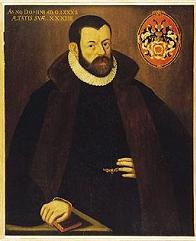 As early as 1568, thanks to the idea of mayor Heinrich Stroband, a Grammar School was established in the city, which 26 years later was raised to the rank of an Academic Gymnasium. However, the residents of Toruń dreamed about their own university. This idea was conceived in the 16th century, however, due to vicissitudinous life, this dream had come true only after five centuries. As early as 1568, thanks to the idea of mayor Heinrich Stroband, a Grammar School was established in the city, which 26 years later was raised to the rank of an Academic Gymnasium. However, the residents of Toruń dreamed about their own university. This idea was conceived in the 16th century, however, due to vicissitudinous life, this dream had come true only after five centuries. University of Toruń University of ToruńDespite the fact that 500 years seems a very long time, the history rewards for this patience. The founded in 1945 Nicolaus Copernicus University has become not only a successor of these centuries-old desires, but the Toruń Alma Mater also inherited rich traditions of such outstanding schools as Stefan Batory University of Vilnius, Jan Casimir University of Lviv, Jagellonian University of Krakow, University of Warsaw, and University of Poznań. Remarkable professors of these school such as the University's first rector Ludwik Kolankowski, an exceptional historian, Władysław Dziewulski, an astronomer, who "moved" the astronomical observatory of Vilnius to Torun, Tadeusz Czeżowski, a logician and philosopher, representative  of the famous school of Lviv and Warsaw as well as Konrad Górski, a historian and theoretician of literature - the beloved master of several generations of Toruń students of Polish studies - made the young Alma Mater of Torun since its very beginnings have a group of leading scholars. That's why this "gifted child" had quickly metamorphosed into a multi-talented "youngster". of the famous school of Lviv and Warsaw as well as Konrad Górski, a historian and theoretician of literature - the beloved master of several generations of Toruń students of Polish studies - made the young Alma Mater of Torun since its very beginnings have a group of leading scholars. That's why this "gifted child" had quickly metamorphosed into a multi-talented "youngster".Let's compare some data: when in May 1946, the then rector of the Nicolaus Copernicus University, Prof. Ludwik Kolankowski solemnly inaugurated operations of  the Alma Mater of Toruń, the school had four faculties: the Humanities, Mathematics-Natural Sciences, Law-Economics and Fine Arts; it engaged 60 independent scientific employees and educated 1,600 students. Today, the University of Toruń is the biggest academic school in the north of Poland featuring 2246 academic teachers, including 630 professors, 16 faculties, 70 majors, and 35,000 students who are educated in 100 specializations. the Alma Mater of Toruń, the school had four faculties: the Humanities, Mathematics-Natural Sciences, Law-Economics and Fine Arts; it engaged 60 independent scientific employees and educated 1,600 students. Today, the University of Toruń is the biggest academic school in the north of Poland featuring 2246 academic teachers, including 630 professors, 16 faculties, 70 majors, and 35,000 students who are educated in 100 specializations. The Nicolaus Copernicus University cooperates with dozens schools, participates in execution of  international projects just to mention COST, COPERNICUS, ClPACT, PECO, PHARE-TESSA, TEMPUS. Thanks to agreements signed with the European Committee within the SOCRATES/ERASMUS program, every year a group of students and scholars travels to western universities. Academic teachers participate every year in nearly 1,000 training programs, conferences, symposia and research abroad, whereas the school itself hosts over 600 scientists from all over the world. Every year the scholars of Toruń take advantage of over 190 grants of the Scientific Research Committee, participate in research projects (among international projects just to mention COST, COPERNICUS, ClPACT, PECO, PHARE-TESSA, TEMPUS. Thanks to agreements signed with the European Committee within the SOCRATES/ERASMUS program, every year a group of students and scholars travels to western universities. Academic teachers participate every year in nearly 1,000 training programs, conferences, symposia and research abroad, whereas the school itself hosts over 600 scientists from all over the world. Every year the scholars of Toruń take advantage of over 190 grants of the Scientific Research Committee, participate in research projects (among  others in Spitsbergen, Antarctica and Island), organize about 100 conferences and scientific conventions of national and international range. others in Spitsbergen, Antarctica and Island), organize about 100 conferences and scientific conventions of national and international range. The scientific capabilities of the Toruń University include also such institutions as the University Center of Nonlinear Research, the Interdisciplinary Group of Early Detection Methods of New Growth Tumors and the Interdisciplinary Group of Environmental Protection and Management.  The local Faculty of Fine Arts, the work of which is named the Toruń school of preservation is a successor of the best traditions of artistic education and the art of preservation of cultural properties, implemented in the University by Prof. Bronisław Jamontt, a painter and graphic artist, co-founder of the Plastic Artists Society of Vilnius. Professors Marian Arszyński and Jan Tajchman compiled documentation, thanks to which Toruń won the designation of World Heritage Sites from UNESCO. The local Faculty of Fine Arts, the work of which is named the Toruń school of preservation is a successor of the best traditions of artistic education and the art of preservation of cultural properties, implemented in the University by Prof. Bronisław Jamontt, a painter and graphic artist, co-founder of the Plastic Artists Society of Vilnius. Professors Marian Arszyński and Jan Tajchman compiled documentation, thanks to which Toruń won the designation of World Heritage Sites from UNESCO. As befits the home city of the greatest astronomer, the  Nicolaus Copernicus University is Poland's leading scientific centre conducting astronomical observations and research. Foundation of the Astronomical Observatory in Piwnice near Toruń, later renamed the University's Astronomical Centre, is an accomplishment of Prof. Wilhelmina Iwanowska (1905-1999), a graduate of the Stefan Batory University of Vilnius, an assistant of Prof. Władysław Dziewulski, with whom she arrived at Toruń in 1945 in order to establish the Nicolaus Copernicus University. It's just in Toruń, where Prof. W. Iwanowska made her most important discoveries in the field of spectroscopy, was a longtime director of the Toruń Astronomical Observatory and an advocate of radioastronomy. Her international scientific prestige contributed to furnishing of the University Astronomical Centre into Europe's third biggest, 32-metre radiotelescope. Professor Wilhelmina Iwanowska, a noble human being, a gifted scientist Nicolaus Copernicus University is Poland's leading scientific centre conducting astronomical observations and research. Foundation of the Astronomical Observatory in Piwnice near Toruń, later renamed the University's Astronomical Centre, is an accomplishment of Prof. Wilhelmina Iwanowska (1905-1999), a graduate of the Stefan Batory University of Vilnius, an assistant of Prof. Władysław Dziewulski, with whom she arrived at Toruń in 1945 in order to establish the Nicolaus Copernicus University. It's just in Toruń, where Prof. W. Iwanowska made her most important discoveries in the field of spectroscopy, was a longtime director of the Toruń Astronomical Observatory and an advocate of radioastronomy. Her international scientific prestige contributed to furnishing of the University Astronomical Centre into Europe's third biggest, 32-metre radiotelescope. Professor Wilhelmina Iwanowska, a noble human being, a gifted scientist  was awarded with the Honorary Citizenship of Toruń. was awarded with the Honorary Citizenship of Toruń. The successors of the works of Prof. W. Iwanowska include among others Prof. Aleksander Wolszczan, a graduate of the Alma Mater of Toruń, a discoverer of the first non-solar planetary system, who since 1997 had lead the Astronomical Centre of the Nicolaus Copernicus University. For many years Prof. Wolszczan has been connected with astronomical centres in the USA; he works as professor of astronomy and astrophysics at the State University of Pennsylvania. He discovered the first planetary system beyond the Solar System by means of a 300-m radio telescope in Arecibo, Puerto Rico. The astronomers' environment regarded this as the biggest discovery done by a Polish astronomer since Copernicus' times.  The University Library is a priceless treasury of the Toruń school with its collection containing over two million volumes, including nearly 440,000 old prints, historical manuscripts, cartographic works as well as such bibliophilic rarities as Ptolemy's "Geography" dating from 1508. The University Library is a priceless treasury of the Toruń school with its collection containing over two million volumes, including nearly 440,000 old prints, historical manuscripts, cartographic works as well as such bibliophilic rarities as Ptolemy's "Geography" dating from 1508. It's hard to overestimate the role of the Alma Mater of Toruń in the scientific and cultural landscape of the city. One has to agree that this respected school bestows a unique intellectual climate upon Torun. This climate is influenced also by other higher schools in Toruń.
  
|
|||||||||||||||||||||||||||||||||||
| All rights reserved Toruń 2005-2009 | About us | CenterMedia |



